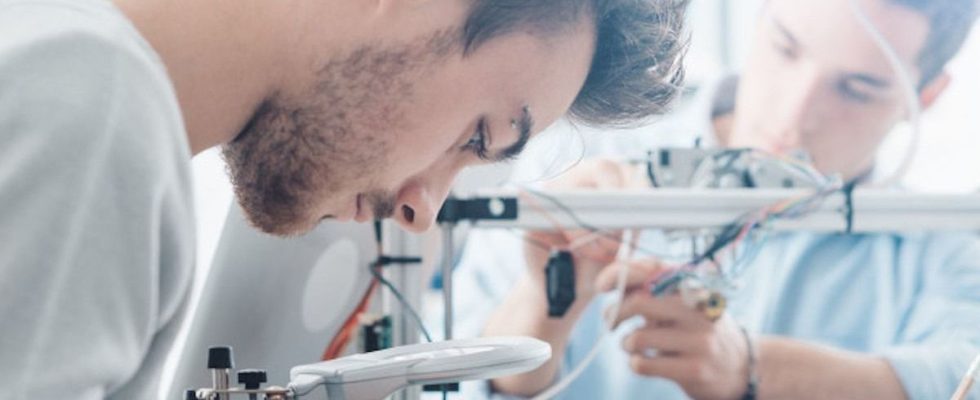Published on
Updated
Reading 2 mins.
Designed for one person but useful for all: tech professionals work in Paris with people with disabilities on concrete and free access solutions to improve their daily lives and their sports practice.
Tom France, an association that wants to “put tech at the service of the disabled”, organized Monday and Tuesday for the second year a hackathon, bringing together developers, engineers and designers to work for 48 hours on IT and engineering projects in a collaborative way. . In a former sorting hall that has become a trendy cultural place in eastern Paris, in front of computers lined up on long wooden tables, thirteen teams of “makers” have been formed, each around a disabled person who has proposed a ” challenge” of his daily life in connection with his sports practice.
Gladys wants to raise her wheelchair so she can dance at the same level as her partners. Jean, deaf and blind, wants to communicate remotely by touch with his loved ones. Johan, quadriplegic, loves the quad and wants to be able to maneuver it with his left hand while he has reduced mobility with his right hand. Léa, in a wheelchair, wants a saddle suitable for riding.
In a corner of the hangar, line up 3D printers and tools – grinder, welding stations – to manufacture the prototype. Hackathon participants invent tailor-made products for sometimes rare disabilities. The finalized prototypes are shown on Tuesday before the technical solutions are put online in free access, in French and English. From the United States to Africa, it will be possible to draw inspiration from them to manufacture these devices, which use accessible materials. These models could also inspire other researchers to go further or adapt them to other disabilities.
FabLabs in rehabilitation centers
“Research in digital technologies, robotics, is the future to facilitate the autonomy of disabled people. We wish on this model to encourage the development of Réhab Labs, FabLabs in rehabilitation centers and medico-social establishments”said Minister for Disabled People Geneviève Darrieussecq while visiting the hackathon on Monday.
The National Handicap Conference (CNH) in April wanted to develop and extend the network of 45 existing “Rehab Labs”. “Everyone has specific needs and the particular devices they need can be custom designed and manufactured on site. Designed for one person, they can be useful for everyone”continues the minister.
For Etienne Moullet, quadriplegic, passionate about wheelchair rugby and handbike (velocouché), “the ‘makers’ have a sensitivity to disability, but that does not mean that they know it. It is an opportunity for us to explain our needs, there are a lot of discussions, it is enriching”.
Marc Teyssier from the Pôle Léonard de Vinci higher education center is working with Jean Bouissou, a deaf-blind person, on an interface to communicate remotely through the sense of touch: “It’s nice to put our skills at the service of useful, social projects. And also for the ‘Maker’ community, which shares this philosophy of innovation, to meet for two days”.
“The goal is also to raise awareness (developers) of disability issues: they spend 48 hours together in immersion, they design while listening to the disabled person’s feedback, they put themselves in their shoes”, explains Claire Chokron, president of Tom France.
In a corner of the hall, we hear cries: a frenzied game of wheelchair basketball is in progress. “Geeks” have taken place in wheelchairs: they have to maneuver the wheels at full speed to move forward, without bumping into each other, while catching the ball and scoring baskets.
